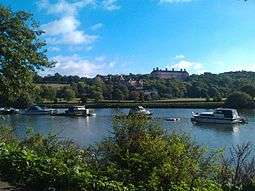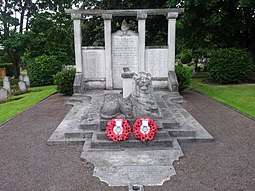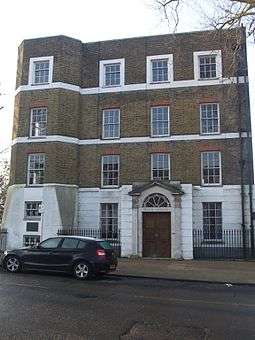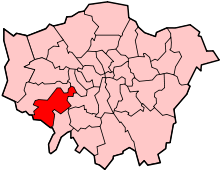Royal Star and Garter Home, Richmond
The Royal Star and Garter Home on Richmond Hill, in Richmond, London, was built between 1921 and 1924 to a design by Sir Edwin Cooper,[2] based on a plan produced by Sir Giles Gilbert Scott in 1915,[1] to provide accommodation and nursing facilities for 180 seriously injured servicemen.
| The Royal Star and Garter Home | |
|---|---|
_2.jpg) The Royal Star and Garter Home | |

| |
| General information | |
| Location | Richmond, London, UK |
| Coordinates | 51.4502°N 0.2974°W |
| Construction started | 1921 |
| Completed | 1924 |
| Design and construction | |
| Architect | Sir Edwin Cooper, based on a 1915 plan by Sir Giles Gilbert Scott[1] |
Listed Building – Grade II | |
| Official name | Royal Star and Garter Home |
| Designated | 30 May 1990 |
| Reference no. | 1254353 |
The Royal Star & Garter Homes, the charitable trust running the home, announced in 2011 that it would be selling the building as it did not now meet modern requirements and could not be easily or economically upgraded.[3] The building, which is Grade II listed,[1] was sold in April 2013 for £50 million to a housing developer, London Square,[4] which has restored and converted the building into apartments.
The trust opened a new 60-room home in Solihull in the West Midlands in 2008[4][5] and the remaining residents at the Richmond home moved in 2013[6] to a new purpose-built 63-room building in Upper Brighton Road, Surbiton, in the Royal Borough of Kingston upon Thames.[3][7][8][9] A third home has now opened in High Wycombe, Buckinghamshire. The possibility of opening a fourth home is also under consideration, and funds have been set aside for this purpose.[10]
History



The site is the location of the former Star and Garter Hotel, which closed in 1906. The building was used as a military hospital, known as the Star and Garter Home for Disabled Sailors and Soldiers, during World War I.[11]
The site was then donated to Queen Mary (consort of George V) in support of her plans to establish a home for paralysed and permanently disabled soldiers. The hotel banqueting hall and ballroom were temporarily used to house disabled soldiers, but they were found to be unsuitable for their specialised needs. Demolition of the hotel buildings commenced in 1919 and from 1920 to 1924 the home's residents were transferred to Sandgate, Kent while the new Star and Garter Home for Disabled Sailors, Soldiers and Airmen was built on the site of the hotel.[11][12] The new building was dedicated in 1924 as the Women of the Empire's Memorial of the Great War.[13] It was formally opened by George V and Queen Mary on 10 July 1924.[14]
In 1948 residents of the home took part in a forerunner of the Paralympic Games, the first national athletic event for disabled athletes, organised by Dr Ludwig Guttmann.[15]
The Star and Garter Home received its royal charter in 1979, adding the prefix "Royal" to its name.[14] Since the opening of the second home at Solihull in 2008 the charity has used a plural form of the name, as "The Royal Star & Garter Homes".
Some of the residents who died at the home were buried in one of two dedicated sections in the nearby Richmond Cemetery. The cemetery contains two plots dedicated to deceased residents from the home, one of which is marked by the Bromhead Memorial, a large classical-style monument listing the names of those not commemorated elsewhere.[16]
Notable residents
Notable residents have included:
- Frederick Jeremiah Edwards (1894–1964), an Irish recipient of the Victoria Cross, who died at the home on 9 March 1964[17]
- Norman "Bill" Jewell (1913–2004), commander of the submarine HMS Seraph during Operation Mincemeat.[18] In 1998, he suffered a serious fall and was paralysed from the neck down. He then went to live at the home until his death on 18 August 2004 aged 90.
- Major David Mills (1918–1993), Secretary General of the All England Lawn Tennis and Croquet Club 1963–1979[19]
- Nancy Wake (1912–2011), who fought with the French Resistance and lived in the home from 2003 until her death.[20][21][22] She died on 7 August 2011, aged 98, at Kingston Hospital after being admitted with a chest infection.[23]
Notable chairmen of the Home
- Admiral Sir Barry Domvile, 1932–1934[24]
- Admiral of the Fleet Sir Caspar John, 1967–1972
- General Sir Charles Harington, 1972–1980
- Marshal of the RAF Sir Denis Spotswood, 1981–1985[25]
See also
- Bromhead Memorial, denoting a plot in Richmond Cemetery in which deceased residents of the Royal Star and Garter Home are buried
- John Burn, honorary anaesthetist at the Star and Garter Home
- W. S. C. Copeman, consultant rheumatologist
- Wick House, Richmond Hill, which, from 1950, accommodated up to 20 nurses from the Royal Star and Garter Home
References
- Historic England. "Royal Star and Garter Home (1254353)". National Heritage List for England. Retrieved 8 September 2016.
- Cherry, Bridget and Pevsner, Nikolaus (1983). The Buildings of England – London 2: South. London: Penguin Books. p. 521. ISBN 0-14-0710-47-7.CS1 maint: multiple names: authors list (link)
- Teed, Paul (18 February 2011). "Royal Star and Garter home in Richmond Hill could be transformed into luxury hotel or student accommodation". Richmond and Twickenham Times. Retrieved 15 January 2013.
- Dyduch, Amy (9 April 2013). "Developer buys Royal Star and Garter for £50m". Richmond and Twickenham Times. Retrieved 11 April 2013.
- "Solihull Home". The Royal Star & Garter Homes. Archived from the original on 17 April 2016. Retrieved 7 July 2016.
- Sharman, Jon (29 August 2013). "Residents move into new Royal Star and Garter home in Surbiton". Richmond and Twickenham Times. Retrieved 13 August 2015.
- Hausmeister, Hana (11 June 2013). "'No all-night parties': Royal Star and Garter reassures residents". Richmond and Twickenham Times. Retrieved 13 August 2015.
- Dyduch, Amy (16 May 2013). "Richmond's final farewell to Royal Star and Garter". Richmond and Twickenham Times. Retrieved 4 July 2013.
- "Our Surbiton Home". The Royal Star & Garter Homes. Retrieved 26 July 2015.
- The Royal Star & Garter Homes. "Investing in New Care Homes". Annual Review 2014/15. p. 12.
- "Royal Star and Garter Home". Lost Hospitals of London. Retrieved 14 May 2014.
- Church, Judith M (2008). "The Royal Star and Garter Home on Richmond Hill". Richmond History: Journal of the Richmond Local History Society. 29: 32–47. ISSN 0263-0958.
- "Coming of Age of Star and Garter Home, Local News (England and Wales)" (PDF). British Medical Journal. 23 January 1937. p. 190. Archived from the original (PDF) on 9 August 2011.
- "Royal Star and Garter Home" (PDF). GB 1992 Archive. The National Archives (UK). 11 December 1998. Retrieved 23 October 2015.
- "Archery Day in Richmond" (PDF). Connections: 7. Spring 2013.
- Historic England. "Bromhead Memorial (1409405)". National Heritage List for England. Retrieved 6 January 2016.
- "Frederick Jeremiah Edwards". Victoria Cross holders buried in the borough. London Borough of Richmond upon Thames. 3 August 2009. Archived from the original on 4 November 2014. Retrieved 4 November 2014.
- Arthur, Max (27 August 2004). "Capt Bill Jewell: Daring wartime submarine commander". The Independent. Retrieved 15 February 2015.
- Edwards, Bill (4 October 1993). "Obituary: Major David Mills". The Independent. Retrieved 6 July 2016.
- "Special Forces Obituaries: Nancy Wake". The Daily Telegraph. London. 8 August 2011. Retrieved 13 August 2015.
- Anthony, Maria (13 August 2011). "World War Two spy and inspiration for film 'Charlotte Gray' dies". Richmond and Twickenham Times. Retrieved 8 December 2015.
- Teed, Paul (8 March 2012). "Memorial held for WWII legend". Richmond and Twickenham Times. Archived from the original on 4 November 2014. Retrieved 29 May 2015.
- "War heroine Nancy Wake dies". The Daily Telegraph (Sydney). 2011. Retrieved 8 August 2011.
- "Newspaper cuttings collected and annotated by Sir Barry Domvile, covering his naval career and relating to the Navy in general". Royal Museums Greenwich. Retrieved 10 May 2017.
- Probert, Henry (1991). High Commanders of the Royal Air Force. HMSO. p. 74 ISBN 0-11-772635-4
External links
Further reading
- Fowler, Simon (1999). "The Valhalla of British Heroism: The early years of the Star and Garter Home". Richmond History: Journal of the Richmond Local History Society. 20: 33–36. ISSN 0263-0958.
- Church, Judith M (2008). "The Royal Star and Garter Home on Richmond Hill". Richmond History: Journal of the Richmond Local History Society. 29: 32–47. ISSN 0263-0958.
- Spencer, Steven (2009). ""Mr Scott may be very upset": Giles Gilbert Scott, Edwin Cooper and the Building of the Star and Garter Home". Richmond History: Journal of the Richmond Local History Society. 30: 24–33. ISSN 0263-0958.
- Venus, Nigel; Willis, Patsy (2006). The Home on the Hill: The Story of the Royal Star and Garter Home, Richmond, for Disabled Ex-service Men and Women. Royal Star & Garter Home. ISBN 978-0952079323.
